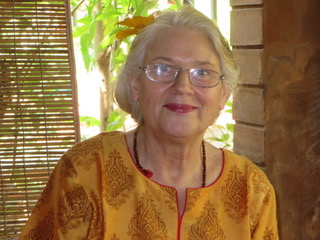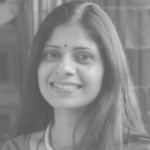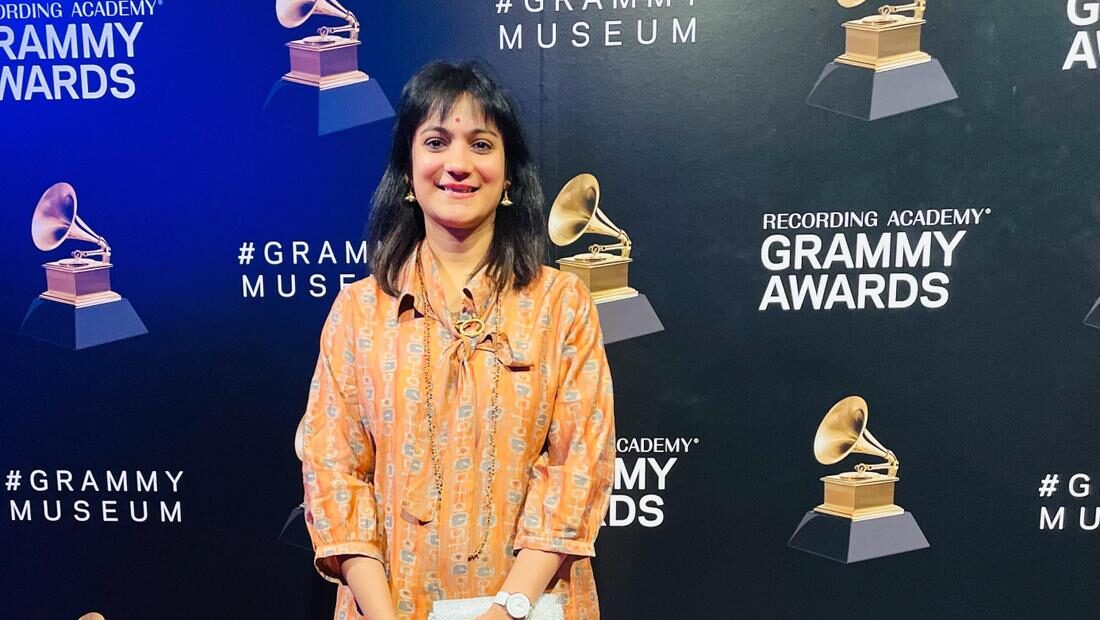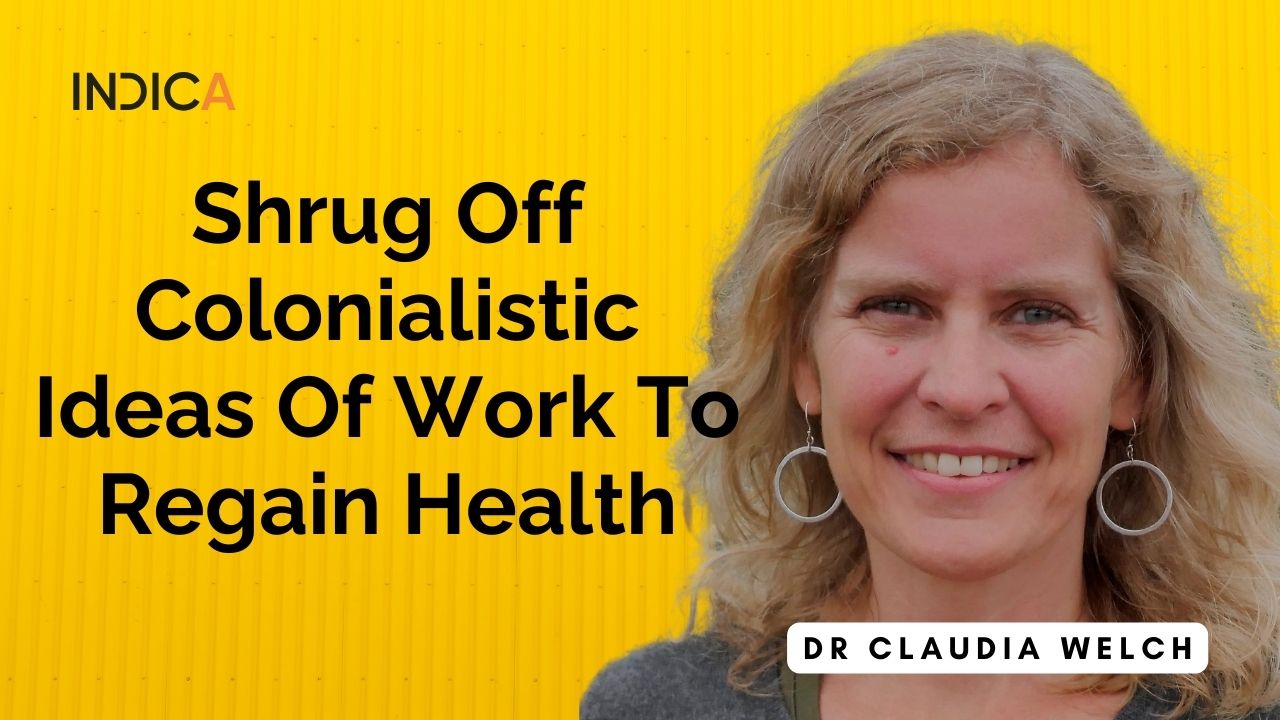Jaisri M. Lambert is an Ayurveda practitioner in Surrey, BC, who has seen the Indian science of self-healing grow in Canada over the last few decades. She describes her affinity to Ayurveda as a ‘karmic tendency’.
“Ayurveda is the sacred holistic understanding of human balanced living, practised throughout history by seers of old, whose vision was subtle, sophisticated and nature-based. The knowledge became refined into a holistic, inclusive life science, emphasizing prevention of disease and fulfillment of one’s spiritual purpose”, says Jaisri. “It is a complete science of health and healing.”
She teaches Abhyanga (Ayurveda Medical Massage Therapy) with Jessica Kruse, Turiya Therapy (Marma Science for Trauma Management & Mental Health), Nadi Pariksha (Pulse Assessment) and other topics imbibed at the feet of her beloved mentor, Vaidya Vasant D. Lad.
She also tailors presentations, classes and seminars according to a group’s interests, for example, ‘Marma Therapy for Modern Dental Practice’ or ‘Ayurveda Case Management Analysis’ or ‘Face Reading and Other Diagnostic Observations’, etc.
Jaisri grew up as Margaret Kirwen in Kerrisdale, Vancouver, B.C. graduating from Magee High School in the class of 1965. Going on to study classics at the University of Paris (La Sorbonne), she became a French teacher. From adolescence she developed migraine headaches. In her twenties, she began researching the possible cause of her pain. Allopathic medicine could neither explain nor treat her condition effectively. Drugs prescribed not only did not work, but also had intolerable side effects.
Soon she was drawn to the mystical sciences of India and discovered meditation. Between 25 and 30 years of age, she says, was a period of intensive spiritual search, study and discovery.
Jaisri met Dr. Robert Svoboda in 1986 in Vancouver, BC. on his first travels abroad to spread Ayurveda, after recently completing his Ayurveda medical studies in India. The location was the Canadian Holistic Healing Association centre on West Broadway, a popular venue where community groups could meet to discuss their favourite health topics, an emerging trend.
At that time, Robbie told her she should meet his teacher, Dr. Vasant Lad. “Those were prophetic words”, she says, and she did meet her mentor-to-be in person within two years.
A lot has changed on the Ayurveda landscape in Canada since then. Today, the Ayurveda Association of Canada brings together those who are passionate about Ayurveda and want to see that prevention is given importance at the federal and provincial levels.
“Investing in the common sense of prevention according to Ayurveda can serve any community, for example, the DinaCharya knowledge alone can prevent many diseases. Any medical enquiry is answered by our beloved Ayurveda. She finds her way into our consciousness, into our lives. So, I think she is doer and we are the beneficiaries”, says Dr. Jaisri.
The number of Ayurveda practitioners in Canada is steadily increasing; their first job is to familiarize Canadians with Yoga’s sister science of Ayurveda, as yet little known to the mainstream.
In 2017 and 2018, Jaisri visited the AYUSH Ministry in Delhi. “I wanted to ask what support we could count on, what are the international standards and how do they feel about our six-year curriculum proposal for Canada.
We are seeking their support for inclusive Ayurveda legislation, educational standards and product imports for Canada. We propose the six-year curriculum to help compensate for our lack of Vedic cultural background, in this anglo-multicultural backdrop here”, says Jaisri.
“Neighbouring America has had practice standards for Ayurveda for several years now. The US National Ayurveda Medical Association designates degrees such as ‘Ayurveda Doctor’, in support of full clinical practice. The US offers the most advanced Standards of Practices and Code of Ethics, though still not as bold as we aspire to be in Canada”, she says.
Canada is very keen on having the entire science and not piecemeal. “We would like to import the entire authentic science, not a fragmented, isolated practise. We do seek support from the AYUSH ministry to help formulate legislation which we plan to present to our Canadian government. We seek government legislation to address Ayurveda in its totality, in its ancient form, so no part is excluded”, says Jaisri. “We feel Ayurveda is a great benefit to Canada, especially now.”
From her first trip to India in 1990, when Jaisri came to practice meditation and explore its impact on consciousness, she has engaged the life process for moving toward moksha. Her migraine issue made her move toward Ayurveda. “If you are a migraine sufferer, you know every system is imbalanced: respiratory, structural, metabolic, hormonal, digestive, nervous systems are all imbalanced. If one has that much deep-seated pain, only a fundamental change can help”, she says.
By studying the Ayurveda system, especially panchakarma science, she says she realised that genetic factors are highly influenceable. “By the Ayurveda Panchakarma method, we can learn to repair even genetic factors and make free will or free choice the dominant influence in the law of cause and effect in our lives”, says Dr. Jaisri.
Jaisri calls meditation the first and last medicine. “This is because not only do we need immediate peace and on-going peace, but we also need to know our place, our stability, our direction, our purpose, our meaning, our individuality. Meditation is an important means of knowing ourselves”, she says.
Jaisri did not look at spreading this knowledge at first because she feels that meditation is a very personal connect with the Divine. “Everyone has their inner guidance. No one can speed up or slow down their destiny”, said Jaisri.
However, when it came to practising Ayurveda as a livelihood of service, Jaisri confesses to a proselytizing tendency, especially when there’s a question or enquiry.
In 1988, Jaisri met renowned Ayurvedic physician and author, Vaidya Vasant D. Lad, an event that deeply influenced her life. “I’ve been a student of Dr. Lad for many years and would note that he responded to people’s questions. He would not initiate discussion. His whole life is an initiation of introducing Ayurveda to the West.
His delivery has been very specific, deliberate and suited to circumstances. From his example, I learned what and when to share, and when to leave aside until the person is ready to formulate their question.”
Of Dr. Lad, Jaisri says, “He’s a maverick, a unique flower. To me the fragrance from that flower has been primarily responsible for bringing Ayurveda to the West in such a good way. He has paved the way for many others to follow and take full advantage of this beautiful carpet he has rolled out. It is with great difficulty and challenge that he has convey the greatness of Ayurveda to us. Many a time, he would say, ‘Look at my bald head! Ten thousand hairs have jumped from this head trying to convey Ayurveda to you!’.”
Jaisri continues, “Most people approach Ayurveda and have their first introduction to these Vedic sciences such as Ayurveda, Yoga, Vaastu Shastra, etc., through a personal need. For a westerner seeking preventative knowledge for wellness, I learned we have to start slowly. Most people’s immediate needs include a meditation practice, a dietary program, individualized stretching routines and abhyanga, which can each be introduced gradually.”
After decades of research and study of meditation and Ayurveda, Jaisri says the practice is ever-fresh. “There is always something undiscovered, some new revelation of our own path and our own knowing, our own relationship to the Divine. Our behaviour, our thinking, our experiences, our interpretation of all that can modified, can become purified through the lens of meditation”, says Jaisri.
Asked why is it that the West with all its material affluence, fresh air and good food, is unable to offer better health to its citizens, Jaisri replies, “Let me challenge the premise that the air is good here, or that the medical system is ideal, or the agricultural practices are sustainable. We have a long way to right past wrongs and to go forward with Ayurvedic and Vedic principles of sustainability. I’ve been deeply influenced by the Vaidyagrama Healing Village in Coimbatore, Tamil Nadu, as a stellar living example of applying the best of eastern and western thinking for self-healing and balanced living."
"At Vaidyagrama, India is demonstrating how to restore the wealth of Ayurveda and showing the world the way back to permaculture, water conservation, air & energy circulation, wellness practices, community service, sustainable buildings and almost zero waste, to highlight only a few critical concepts of healthy living. Vaidyagrama demonstrates that Health results in happiness, when the bodily relationships, family relationships and community relationships are in integrity together.”
Jaisri hopes that Covid-19 will establish a new norm of balance of the elements of land, water, manufacturing, air and space. “This is the first time in our lifetime, in our children’s and grandchildren’s lifetime, that we’ve seen something like this, so we should take note. The five global cosmic elements are the human constituents and are to be properly nourished to remain in healthy relationship”, she says.
Dr. Jaisri says her favourite aspect of Ayurveda is that it’s an inclusive science. “Ayurveda is the science of all of the life and therefore all inclusive. It makes nobody wrong, everybody belongs. All phenomena belong to Ayurveda, whatever their nature. Everything has a place and our job is to understand place. This is a big thing to understand, so the science has a big name: the Science of All of Life.”
Ayurveda includes Dravaguna (properties of substances) giving emphasis to the dietary and pharmacological characteristics and actions of Rasa (Taste), Virya (Thermal Effect), Vipak (Post-Digestive Effect) and Prabhau, (unique pharmacokinetics and pharmacodynamics of substances, especially food and medicines).
It includes Sapta-Dhatu (physiology of the Seven Tissues metabolism), Pathology, Genetics, Embryology, Psychiatry, Newborn Care, Elder Care and Communicable Disease Management, among other sub-sciences. As an inclusive science, Ayurveda can be the lens for all sub-sciences.
Ayurveda includes the all-important Dina Charya (Daily Preventative Practices), engaging the law of cause and effect for healthy outcomes each day. “Implementing habits and practices each morning, from the first realization that we are awake, to bring gratitude and prayerful communion in preparation for devotional practices”, says Jaisri.
The early morning meditation generates an imprint to set out intentions for the day and life. “That morning imprint infiltrates each and every thought, word, deed and aspect of life. Following a personal Dinacharya can uplift our personal destiny along our journey of self-realization. We may know it or not know it, nonetheless this evolutionary impulse is unfolding. DinaCharya shows us we have a say in this duality of lightness and darkness. The morning routine is deeply purposeful”, Jaisri explains.
Ayurveda also includes dietary factors. “Diet should be according to personal needs and not according to marketing, family or cultural conventions, especially when symptoms develop. For therapeutic choices, one needs to understand one’s own properties or nature (Prakruti) and the properties of the disease (Vikruti). Then easily the therapeutic foods and herbal items can be chosen”, she says.
“Ayurveda is truly all-inclusive and all-loving. She’s especially accessible when symptoms bring suffering,” says Jaisri in closing.
Jaisri M. Lambert, Ayurveda Doctor (NAMA) can be reached www.ayurveda-seminars.com





